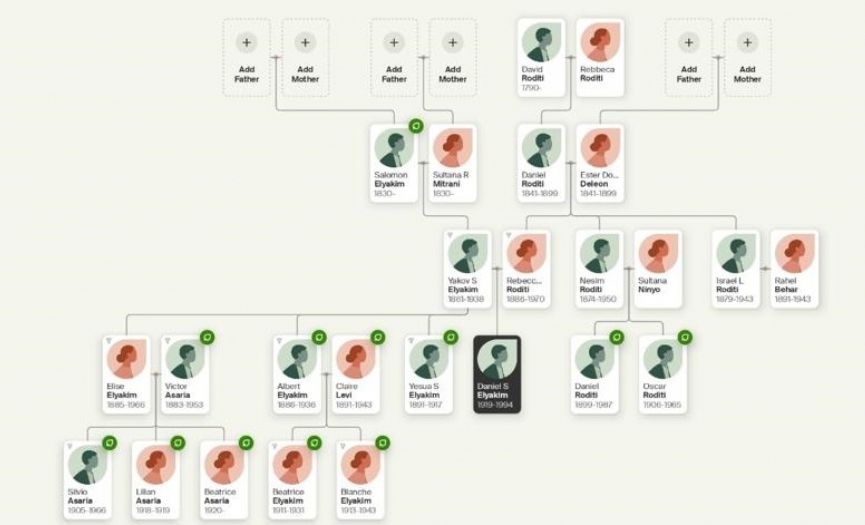
Finding Our ´Roots´ is Now Possible
The Quincentennial Foundation Museum of Turkish Jews is giving start to a new project. The project ´Looking for Our Roots´ will offer Turkish Jews and Jews of Turkish origin who want to learn about their family trees, the chance to know about the previous generations of their families.
Translation by Janet MITRANI
We listened to the specifics of the project, which has already started to attract great attention abroad, from the Quincentennial Foundation President Silvyo Ovadya, and the Museum volunteers, Emel Benbasat and Selim Kastoryano, who will take part in the project.
Silvyo Ovadya: We are seeing many people who want to learn about their family tree among those who visit the Museum of Turkish Jews as well as people applying to the Chief Rabbinate of Turkey. We are receiving at least 3 or 4 requests on this issue. For example, a visitor from Panama, who came to the Museum last week, told us that he was looking for his roots, mentioning that his grandfather had lived in Urfa. Three days later six French young people visited the Museum. One of them said, "My grandfather was also a good friend of Nedim Yahya. Our roots are here. With my father, we are searching to find our roots." Until today, not being able to help people who came to us with these requests was troubling us.
Jews living in Turkey, more or less, have information about their origins. However, the Turkish Jews who are living abroad usually have missing data. These people, especially when they come to a certain age, start a quest to complete the missing pieces. Their searches especially escalate when they visit Turkey.
Today approximately 15 to 16 thousand Jews are living in Turkey, however, when we look back in history, we find that this number had been much more, and very serious amounts of people had migrated to various parts of the world.
Silvyo Ovadya also mentioned the problems the project is confronting:
"It is not so easy to implement the project. First of all, we had to examine the legal aspects of the project. We talked to some lawyers and obtained information in the context of the protection of personal data. Correspondingly the first point to be emphasized about the 'Looking for Our Roots' project is this: People who want to participate should give confirmation and sign a form stating they would not share/ publish the data they have obtained on any media, and in the case they do, all responsibility would be their own. The sharing of genealogical information is possible if and only if the surviving people on the list have given their consent, and that, of course, is the responsibility of the person requesting the family tree."
Ovadya expressed that Emel Benbasat and Selim Kastoryano would try to meet the demands from both Turkey and abroad, with the work they will accomplish within the scope of the Museum.
Ovadya stating that families had drifted apart a lot in history, said, "Especially during the First World War there was a great amount of immigration to France. South America also received a large number of immigrants from the Turkish Jewish Community. Some also left for the US, though not the same amount. There was a significant amount of immigration to Israel before the Israeli State was established as well as after. Therefore we believe there will be many requests from these countries to search for their roots. We will try to meet all the demands, of course within our means. Unfortunately, there is no guarantee that we will be able to respond to every request.
Emel Benbasat gave information, especially on which areas' archives are accessible:
"We can access the archives of Istanbul, Izmir, and Edirne regions. By also using the Israeli National Archives, we can easily reach the records of these regions. However, the [Jewish] communities of Southeastern Regions such as Urfa, unfortunately, hadn't kept records. Therefore, sadly, we will not be able to respond if there is a request for this region. Other than that, the archives of some communities have been damaged in disasters like fires, floods. So the records we are able to access are limited..."
Selim Kastoryano stating that the research is limited to the borders determined by the National Pact (Misak-ı Milli) added, "Unfortunately the Ottoman Era communities such as Jews of Thessaloniki, Jews of Rhodes are not within the scope of our study. We are only focusing on the communities within the 1923 borders."
Kastoryano is especially reminding the Turkish people who want to participate in the research saying, "If the Turkish citizens who want their family trees to be studied send us their genealogical information, it would be a great help in the research. The genealogical information can be obtained from the e-Devlet (e-Government) website. The applicant's getting this information from e-Government and forwarding it to us would speed up the process, and help us expand it."
Kastoryano expressing that they are frequently asking questions to the applicants from abroad during the research process, said, "We are guiding our research by asking them questions via e-mail or WhatsApp from time to time."
Ovadya is stating that the research is being done with a donation: "We request that the amount of Turkish Lira equal to $100 shall be deposited to the account of Quincentennial Foundation..."
The e-mail for those who want to participate in the project: [email protected]
The Quincentennial Foundation (500. Yıl Vakfı) Account Number to participate in the project:
Şişli/Garanti Bankası TL :TR75 0006 2000 1520 0006 2925 53
Related News












